What it's like to ride the Tour de France
When the credits roll on the Champs-Elysees, the winner takes the top billing, his name in foot-high letters, filling the screen. But the cast of supporting actors and crew is long and everyone has a role to play in creating the drama. Even those without a speaking part add something to the story.
Cycle Sport has asked some of those who have suffered and survived the great race to reflect on the parts they played. Some enjoyed a moment of great joy. For some it was the springboard to further success, for others a single glorious memory to cherish. And for others the Tour pushed them to their limits.
We asked the question, what’s it really like to ride the Tour de France? Some of the answers offer the most revealing insight into what the great race is like.
Words by The Cycle Sport team
Photography by Graham Watson
WHAT IT'S LIKE TO... WIN A STAGE
SIMON GERRANS
Australian, won a stage at Prato Nevoso in 2008
Now 30, riding for Team Sky
When people ask what you do for a living, you say you are a cyclist. The next question is “Do you race the Tour de France?” So, to say that you have won at the Tour de France is something else. You have the win with you for the rest of your career, your market value goes up.
The latest race content, interviews, features, reviews and expert buying guides, direct to your inbox!
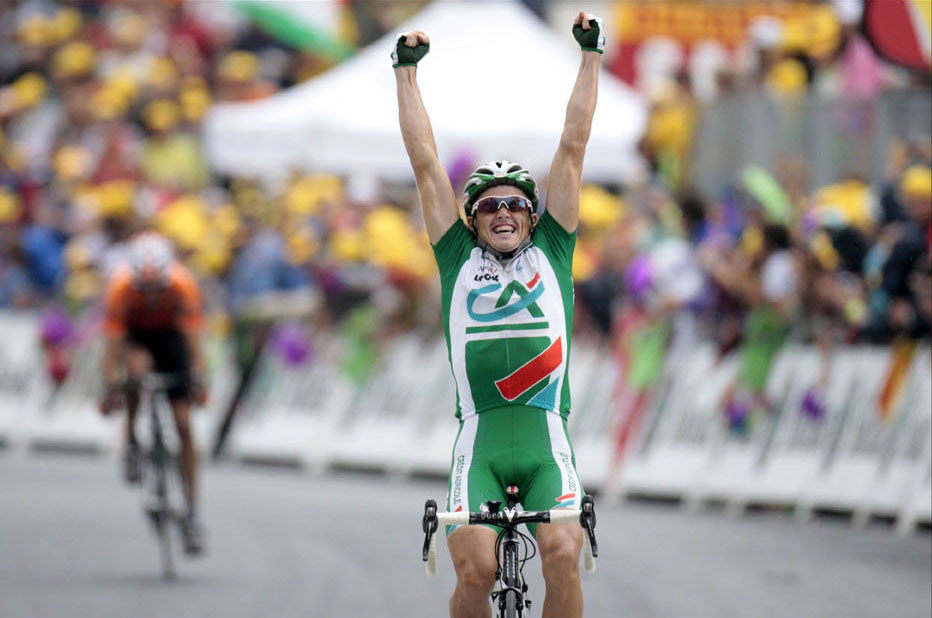
Winning at the Giro d'Italia and the Vuelta a España was also important but I can promise you I did not get as many phone calls or messages. At the Tour de France, when I got to my phone one hour after the win, I had about 60 missed calls and 200 text messages. That just shows the power of the Tour, everyone knows what is going on there.
My wife drove to meet me immediately after watching the stage on television. I was glad I won the stage to Prato Nevoso because it was the closest stage to our home in Monaco. In fact, she arrived at the hotel nearly at the same time as I did!
I didn't get a lot of sleep that night, I was still buzzing for some time. It was my fourth Tour de France, it took me four times until I made the right breakaway and got a win. I had a tough time on the next stage, I was tired. But I can tell you that the win gave me more confidence and the knowledge that I am capable of winning.
MASSIMO PODENZANA
Italian stage winner at Villeneuve-sur-Lot in 1996
Now 49
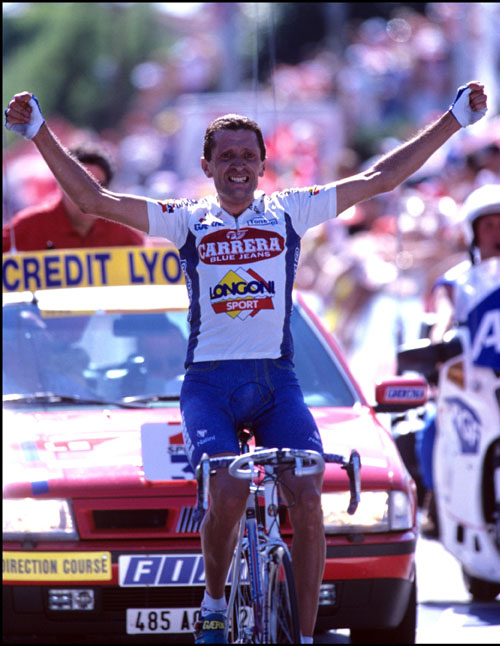
I had won a stage at the Giro d'Italia, worn the pink jersey and won two national titles but the Tour de France was completely different. There was a sea of people at the press conference - at the Giro there had been 10.
I was lucky, but talented as well. The year before I was second to Laurent Jalabert and this time I was in an escape with Michele Bartoli, Peter Van Petegem and Neil Stephens. I took my chance in the final kilometres, got 300 metres and kept it thanks to my abilities as a rouleur.
I made a roar at the finish line, which was not for me but payback for my wife and children, their sacrifices. They had suffered with me in that difficult year, when my San Marco team lost its sponsor only one month before. I thankfully got a contract with Carrera, so I was lucky even to be at the Tour.
Thanks to the win, I was able to get a good contract with Mercatone Uno for four years. I was already old, 34, but I was able to go on and help Marco Pantani win the Giro and Tour two years later. To ride down the Champs-Élysées and finish the Tour de France is amazing, but to ride down it with the overall winner is completely different. My win was huge but to help Pantani win the Tour was twice as big.
FILIPPO POZZATO
Italian who won at Saint-Brieuc in 2004
Now 28, he rides for Katusha
I knew I was going well into that Tour, I thought something was possible. That win was one of my biggest wins after Tirreno-Adriatico the year before, and to consider I was only 22 and it was my first Tour de France. I won in the seventh stage, against guys like Paolo Bettini, Juan Antonio Flecha and Laurent Brochard.
There was nothing special that night, just a bottle of Champagne with the team at the dinner table. But, [team manager] Giancarlo Ferretti pulled me aside and said, 'Congratulations, it's not every cyclist that races the Tour at your age and wins a stage. You're a great rider and you should now realise that.' That meant a lot to me because of his history in the sport.
I really don't think I realised immediately what had happened, the significance took a while to sink in. The next day everyone in the peloton came up and congratulated me. A stage win gives you the feeling that you are a strong rider. Above all, it gives you respect from you peers in the group. The others start to consider you more, you can feel that you are no longer the same rider in their eyes.
EDDY SEIGNEUR
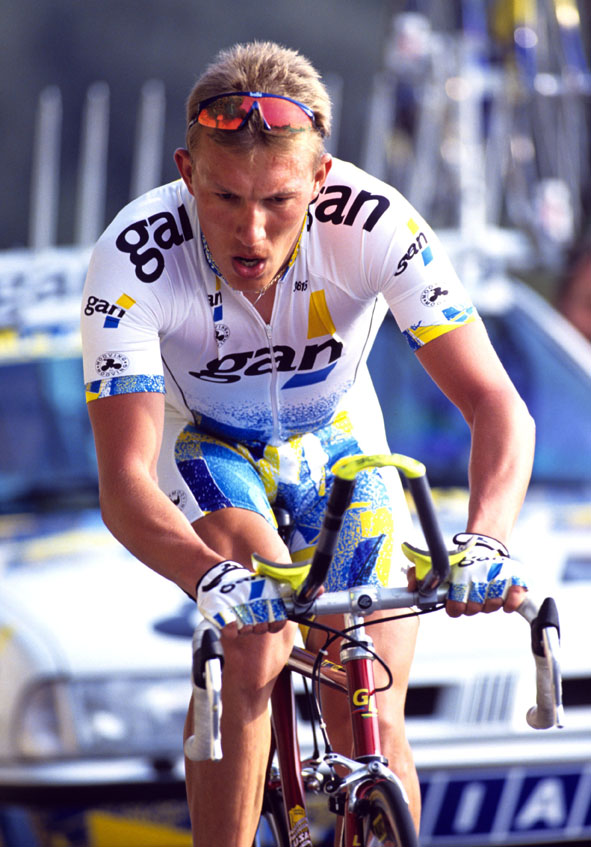
French rider who won on the Champs-Elysèes in 1994, riding for GAN
Now 41, he manages logistics for the Astana team
The Champs Elysées was such an incredible opportunity for me. It’s always a stage for sprinters, and that one year, it fell to the rouleurs.
There were only three riders left in my team, and around 110 who actually finished the Tour, a lot fewer than these days. Thierry Gouvenou was our man to get into the break – he did so, but punctured. As soon as I saw that I attacked to take his place.
We held a 30 or 40 second advantage over eight laps of the Champs, and in my head, I’d told myself I’d go with a kilometre to go. But Frankie Andreu went just before the tunnel, with two kilometres to go – I was scared because he got an advantage while the others just watched.
I told myself, ‘keep to your plan’. If I won, I won. If I didn’t, I would still have done my best.
At 800 metres, I attacked, caught Andreu, and crossed the line first. Such enormous emotions. I was exhausted from three weeks in the peloton, always getting dropped in the mountains, and to lift my arms on the Champs Elysées was immense. We’d won the Prologue, with Boardman, and now I’d won the final stage – Roger Legeay [GAN manager] told us we’d given the Tour its beginning and end. Even though we were exhausted, we stayed out until five in the morning.
Two images stay with me from that day. First, Andreu attacking. I really thought that was the end for me. I felt both fear, and pity for myself, that I’d missed my chance. Then, looking up the Champs Elysées as I won the stage, at the Arc de Triomphe.
***
WHAT IT'S LIKE TO... WEAR THE YELLOW JERSEY
JORGEN VAGN PEDERSEN
Dane who wore the yellow jersey for five days in 1986
Now 50, the former CSC directeur sportif works as an instructor for a chain of gyms in Denmark
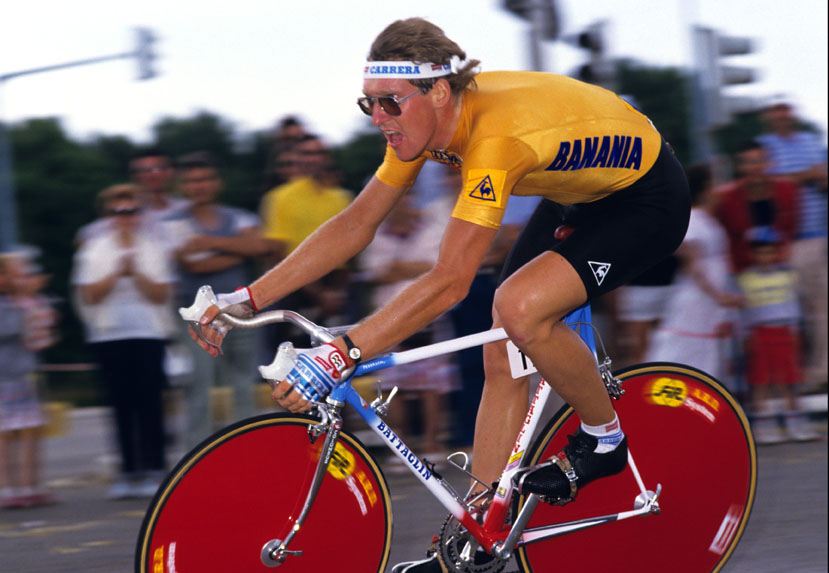
I had won a stage in 1985, but 1986 was my second Tour. It was in the first week and I got in a breakaway with a number of other riders. I don't remember who was in it or who won [Ludo Peeters won, Miguel Indurain was third, Pedersen fourth from an 12-man break].
I was with the Carrera team and our leader was Stephen Roche, who was one of the favourites. We'd been second in the team time trial so we were all well-placed overall, all in the first 30.
I got in this break and I think I won some bonus seconds in the sprint but I wasn't racing for the yellow jersey, maybe the stage, but the main reason to be in the break was to keep an eye on things for Roche.
Towards the end, Davide Boifava, the sports director, came alongside me and he didn't say anything about the yellow jersey. I have no idea if he knew I had a chance of taking it but I know I didn't.
I crossed the line and I saw a Danish journalist I knew. He was excited but cautious. He said: "I've been doing some calculations and I think you have taken the yellow jersey. I think."
Well, I thought he must have got his numbers wrong because out on the road I had no idea I was close. I thought: "It can't be right." But then they are calling me up to the podium.
Then I realised he was right. It was absolutely huge for me. Incredible. I had the yellow jersey on my back and goosebumps on my skin.
When I came off the podium there was no one there, no one from the team waiting. Normally the sports director would be there to take you back to the hotel in the car. But no one knew about this, it seems, so I was left all by myself.
I'm in the yellow jersey, there's no one from Carrera around. I have my bag that the soigneur gave me after the finish, that's all. Fortunately, inside there was a piece of paper with the name of the hotel on. So, I am riding around this little town [St Hilaire du Harcouët in Normandy], in the yellow jersey, asking members of the public where the hotel was. That wouldn't happen today!
It was only a short ride, maybe ten minutes, and I arrive at the hotel and my masseur has seen what happened on TV and he is waiting for me outside the hotel with tears in his eyes.
I was not the leader in the team and there was a time trial two days later, so the first day I was in yellow I did not have any help. Boifava thought I'd lose it in the time trial but I didn't. I had been Danish amateur champion in the 50km time trial three times. I kept it for five days, until the Pyrenees. In the end, it was a relief to see it go. I got so much attention and there was a lot of stress. No one from the team explained to me how to handle it. Maybe they didn't know.
In the mountains all the big guns fired. Hinault, Lemond, those guys.
What's the best thing about the yellow jersey? There are many good things but something that sticks in my mind is this. In those days you had to wash all your own kit after the stage, in the bath or the sink. Having the yellow jersey was great because each day they gave you a fresh, new one, so it was one less thing to wash.
BRAD McGEE
Wore the yellow jersey for three days in 2003 after winning the prologue in Paris
Now 34, he's a directeur sportif for Saxo Bank
You’re like a rock star. I remember opening the camping car door at the start the morning after and there’s just a sea of people outside. The guys were laughing and I said: “Get a load of this.” For our team [Française des Jeux] it was a really massive thing.
You realise how symbolic that jersey is because all eyes are on the jersey, not on the mug that’s wearing it.
I’ve been at the Olympics and I’ve won gold but there you’re competing in one of a number of sports. At the Tour, there’s the same amount of attention on one race and you’re leading it.
It was extraordinary. After I won, my wife was fighting her way through the crowd to get to me and we managed to have a private moment and she said: “You’ve done it.”
I slept really well that night, but I’m not sure the team staff did. They had a few beers.
In the race, it’s an amazing feeling. You get more room, you get the respect that everyone shows the yellow jersey and people want to ride next to you. In the neutralised zone, Lance wanted to ride next to me.
For us, as a French team, the sun was shining and it was time to make hay. We maximised the publicity, we did every interview, every TV show we could because it was a huge deal for us and the sponsors. I was in incredible physical condition but all the extended interviews became mentally draining. When I lost the jersey I can remember Marc Madiot saying to me: “You know what? That’s enough now.” Having the yellow jersey extracts a lot more out of you than normal racing does and you get completely sucked in.
I got a bag of yellow jerseys but that went missing so I’m down to a couple. My brother put one in a nice frame, the other is in my trophy room, in a bag of old memories.
FLAVIO VANZELLA
Italian who won the yellow jersey in Brighton in 1994
Now 46, he's a wine producer
I will never forget the day in Portsmouth. I did not think there would be so many fans on the roads, and ones who were yelling my name in an English accent.
I lost it on the first day in France to Sean Yates. I had hoped to keep the jersey until the time trial, but there was infighting between the Belgians and Italians on the team.
One of the yellow jerseys is still folded and sitting with other shirts in my wardrobe. I framed the other one and hung it on the wall at our winery. I started making wine right away after cycling. It is a difficult job and a beautiful environment to be a part of, like cycling. Gradually, my business is growing. We are now starting to work with a British importer. For the first time since that day in Portsmouth, I am going back to England for a wine fair and to help close a deal.
My days in the yellow jersey gave me more confidence in my career and it easily doubled my contract, though I still did not make the money of a football player. However, making wine, I am doing all right.
***
WHAT IT'S LIKE TO... WEAR THE YELLOW JERSEY FOR JUST A DAY
SEAN KELLY
Irishman who wore the yellow jersey for one day in 1983
Now 54, he commentates for Eurosport
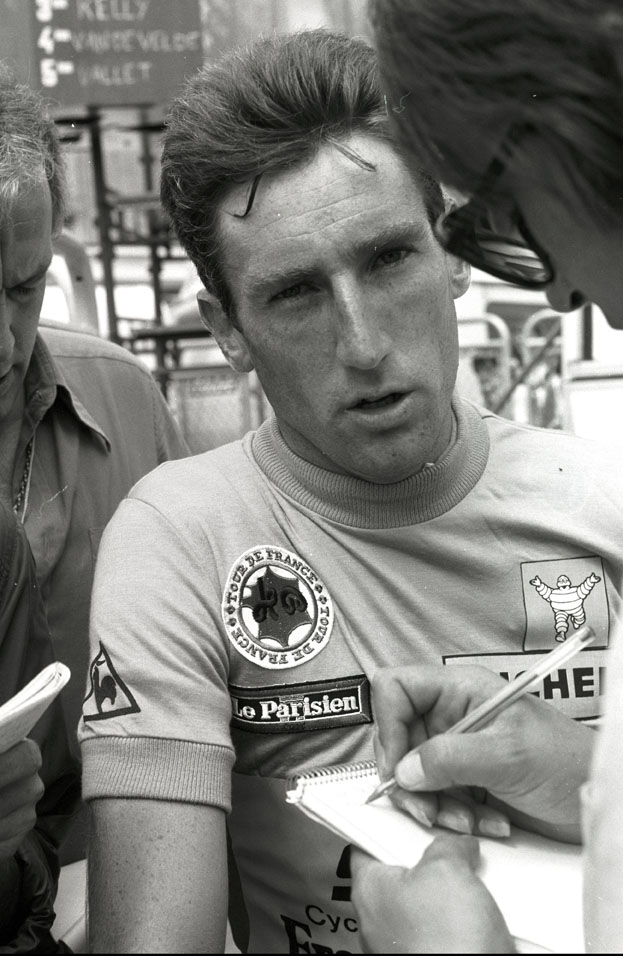
Growing up in Ireland I didn’t really have a sense of what the Tour of France meant or how significant the yellow jersey was. I knew of Shay Elliott but when I was 13, 14, just getting into cycling, you couldn’t find things out the way you can now. A guy in the club used to get Cycling Weekly, ten days or two weeks after it came out, and he’d keep it to himself for a week, so we were quite behind on what was going on.
In any case, the Ras, the big stage race in Ireland, was the main event for me. The leader wore a yellow jersey and I didn’t make the connection – I didn’t realise they had a yellow jersey at the Ras because of the Tour of France. We just assumed the Tour of France was a bike race for French people. Then you realise there’s a whole world out there.
By 1983, I’d ridden the Tour a number of times and I was on the long list of favourites. I was riding for the general classification, and to stay up there and take time on the climbers I was sprinting for the time bonifications. I knew, heading into Pau, that I had a chance to take the yellow jersey if I went for the intermediate sprints. By the time we arrived at the finish, I had calculated that if I won the sprint for third place I’d be in yellow. As it turned out, I took the lead from Kim Andersen by one second.
You go to the podium and get the jersey but even as you stand there and wave to the crowd you’re thinking ahead. You know there’s so much torture to come, you want to get into rest and recovery mode. The team manager, Jean de Gribaldy, was very experienced and he wasn’t carried away. The yellow jersey was nice but it wasn’t the goal.
My day in yellow was brutal. Over the Aubisque, the Tourmalet, the Aspin and the Peyresourde. I was very bad early on. Was it the pressure of the yellow jersey weighing on my shoulders or was it that I was always going to have a bad day there? The pace on the Aubisque was very fast. Just like now, there is so much attention on the yellow jersey, especially when he’s dropped. I had five or six motorbikes around me, cameramen filming me, taking photos. I didn’t lose my head at them but it was very irritating. It was a hot day and the fumes are so poisoning.
I felt better towards the end but I lost 10 minutes and slipped down overall, six minutes behind the new leader. It was very deflating but you have to carry on, get into recovery mode and forget about it.
I kept my yellow jersey, with the numbers still pinned to the back, to Paris. We were having a meal after the final stage and I left my suitcase in the car outside. The car was broken into, the suitcase was gone. I called the police and they found the suitcase and some possessions strewn in a nearby street, but not the yellow jersey. It was very upsetting to lose the one I’d actually worn, although the Tour de France did send me a replacement, which is framed at home. I put it up there with the Milan-San Remo and the Paris-Roubaix and the other big Classics I won.
Having the yellow jersey only once is a regret. When I rode for PDM, I was very close and the manager, Jan Gisbers, said I should go for the time bonus sprints. But I said no, I didn’t want to get into the situation of making the team defend the jersey. That was my decision, but I regret not going for it now. Still, to have the yellow jersey just once is special.
ROBBIE McEWEN
Wore the yellow jersey for the team time trial in 2004
Now 38, rode for Katusha last season
The night I won the stage, the missus was really happy – she’d always wanted a Credit Lyonnais lion, and I got a big one and a small one. One for her, and one for my son.
I did a reasonable prologue in Liège, ran second the next day, won a stage, then when it split on the cobbled stage, I was third. Thor Hushovd had been caught behind, and a journo told me I’d got yellow. I didn’t believe it, but then a Tour guy came and told me to go to the podium. I’d won it by a second.
The next day was a team time trial. I didn’t get to be presented to the crowd – we just turned up, warmed up on the rollers and the television just ignored us because they were focused on US Postal and whoever.
I didn’t sleep in the jersey or anything, but I wore it back to the hotel. My family was there, so I carried on wearing it. Then French TV wanted to speak to me, so I had to wear it for them as well.
For the team time trial the team didn’t have any yellow aero helmets, so I rode with an ordinary helmet which was yellow. We lost five minutes.
***
WHAT IT'S LIKE TO... CRASH OUT IN YELLOW
CHRIS BOARDMAN
Knocked unconscious in a crash while wearing the yellow jersey during stage two in 1998
Now 41, he has his own brand of bikes
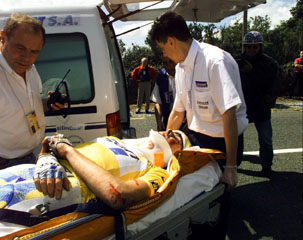
The Tour is all about elation and disappointment. You know the latter is coming at some point.
It was disappointing to crash out in yellow, of course, but it’s actually more embarrassing than anything else.
And it was actually more disappointing when I crashed out of the race the previous year, as it was a decision I had to make – pulling out five days after the crash actually happened. It’s that mental strain that is such a challenge, knowing I was as good as I could have been that year.
But in 1998, although I crashed out in the yellow jersey, it wasn’t a decision I could make myself – that was just a fate thing.
Of course, you also have to remember that this was 1998 – the year of the Festina affair – so the fact that I’d crashed out in yellow went somewhat under the radar.
WHAT IT'S LIKE TO... PULL OUT OF THE RACE WHILE IN YELLOW
STEPHANE HEULOT
Quit the 1996 Tour with tendonitis while leading the race
Now 39, he is manager of Pro Continental team, Saur-Sojasun
You live for moments like getting the yellow jersey in cycling. When it happened to me, it was a dream. For me, my biggest achievement was winning the French championships, but everybody else just remembers the yellow jersey.
I’d already had a bad knee for a few days before I took the jersey, and it got worse and worse in the bad weather.
In the mountains, I turned the pedals slower and slower, and then couldn’t turn them any more. The moment I put my foot on the ground, I knew it was over. I’d hoped and hoped and hoped, but it was impossible.
Sitting in the team car on the way to the finish was an interminable journey. There was silence. Nobody spoke. I’d wanted to lose the jersey in a battle – it was my regret not to be able to.
My yellow jersey is in my house. I’m proud of it, and people still talk to me of it, but frankly, it is in the past. I have another life now.
***
WHAT IT'S LIKE TO... RIDE IN A LONG SOLO BREAK
CEDRIC VASSEUR
Made a 150-kilometre break on the stage to La Châtre in 1997
Now 39, president of the CPA, the professional cyclists' union
I got a win to match my dad's, 37 years later, only mine also came with the yellow jersey. I had not thought of trying to win a stage, it was only my second Tour de France. I think if you are Contador or Cavendish then you expect that you will win a stage one day and you are always fighting for that day. Whereas, I had nothing planned that morning.
Going solo was the idea of our director, Serge Beucherie. After one hour of high-speed racing, no escapes were allowed to go, and then we had about 30 minutes of calm, when I stopped for a piss. Afterwards, I talked to Serge and he said 'Why don't you try an escape because we are all falling asleep back here.' Serge towed me back up to the group and I just kept going through it and off the front.
He kept me company with time checks and news on the group behind. I sensed France starting to go crazy because the previous stages had ended in sprints, dominated by foreigners, plus, French TV was making the most out of my escape. Because it was such a long escape, they had enough time to send a cameraman to my dad's bike shop to follow him watching the stage.
My big advantage was down to nothing and I was worried because I knew how minutes can turn to seconds in the last kilometres. I made it to the red triangle and I knew I had won it. I stated to celebrate and my dad celebrated too, as French TV was still showing him live.
That enthusiasm from the fans is different than today, I don't think that that same level has returned since the Festina Affair happened a year the year later. After the 1997 Tour, it was awful, I could not go to the shops without being recognised by everyone. Everyone had seen me on TV for three hours.
**
WHAT IT'S LIKE TO... FINISH OUTSIDE THE TIME LIMIT
JAY SWEET
Australian rider, eliminated on stage 15 at Piau-Engaly in 1999, his only Tour
Now 34, he's training for his sea skipper's licence in New Zealand
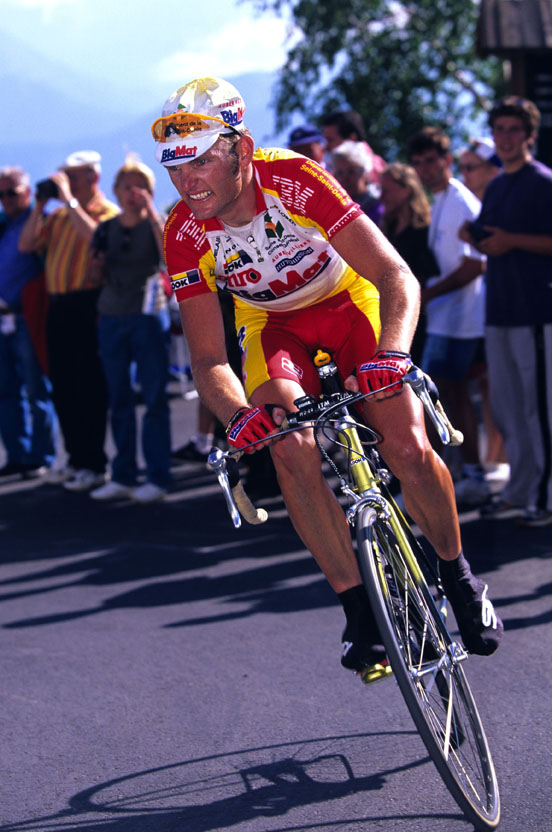
I was riding for Big Mat, a French team, but I was living with Stuey [O’Grady] and Henk [Vogels] at the time. I asked them what the Tour was like and they said “Mate, until you do it, you don’t know what it’s like, you can’t prepare for it.”
You race the all year round with the same riders but for some reason it’s different to everything else. The speed, the distance, the media attention, the specators. It’s intense.
Before the Tour, the team made me do three stage races back-to-back – the PruTour in England, one in Spain then the Route du Sud. Three weeks of racing. I had eight days rest but I was going into the Tour pretty fatigued. At the medical the doctor told my director I had a haematocrit of 39 and said: “He shouldn’t be starting.” My director said: “You try telling him that.”
Day two, they sent us over the Passage du Gois, this track that went out into the sea. It was ridiculous, wet and slippery but they did it for the spectacle. I’d crashed just before it in a big pile-up and I got back on just as we reached it and I went down again. I never crash twice in a day. I pulled myself out of the sludge on the side of the road and this guy, [Michele] Coppolillo of Mercatone Uno was screaming in pain. His handlebars had turned and the bung had come out of the end and it had taken a perfect piece of flesh out of his leg, the size of a cork. I thought he was out but later I saw him with his leg bandaged and I pushed him on a couple of the hills because I thought, if he has the guts to get back on after that, the least I can do is help him.
My troubles started then because I’d hurt my ankle pretty badly. I suffered every day but it was in the mountains it got really bad. The day to Sestrieres, I was just outside the time limit, by maybe three minutes, but they let me back in because the weather had been so bad. I was an hour behind Armstrong, who won the stage.
On one of the hilly stages I was in trouble again and it was just me and a Spanish guy [Pedro Horrillo] off the back. With 30k to go he was knackered and wanted to ease up but if he gave up, he wouldn’t make the time cut. So I pointed to my back wheel and told him to keep going. I dragged him to the finish and as we crossed the line, he thanked me. His team-mates and a director also came up to me the next day and patted me on the back.
The mountains were terrible. I spent day after day out the back, on my own, or with one other guy. At Sestrieres, as I climbed up, the crowd were walking down the mountain but after that the media had covered my story a bit and people were waiting for me. I assume the Broomwagon was behind me for a lot of the time but I never looked back. Never.
On the Alpe d’Huez stage I was really struggling on the flatter part in the wind and I let a gap open. If I’d been dropped then it would have been trouble but I felt a hand on my backside pushing me to help me close the gap. It was one of the guys from Mercatone Uno. He’d remembered what I’d done for Coppolillo. Stuff like that doesn’t happen in other races.
In the mountains, out the back, on my own, it was sheer agony for an hour, then you descend for half an hour then it’s sheer agony again. It’s very lonely out there, totally demoralising. You’re left alone with your mind but you can’t ease up because you’re calculating. How much time can I lose? Okay, I can lose 20 minutes on this 15-kilometre climb. It sounds a lot but it’s not. I wasn’t dawdling along picking my nose, I was going as fast as I could.
But you think – why am I doing this? Why can’t I ride up there with the bunch? You’ve got a lot of time to think and they are generally not positive thoughts. One half of your brain is saying “Pull over, it’ll all be over in a minute if you just pull over.” The other half is having a go at you, telling yourself not to be weak.
In the end, they eliminated me at Piau Engaly, the last mountain stage. I crossed the line outside the time limit and they said that’s enough. It was disappointing because I would have made it to Paris if they’d let me stay in but at the same time there was relief that it was over.
Now I’m working as a builder while I get my qualification for my skipper’s ticket so I can take a boat out and fish commercially off New Zealand. I love it out there when all you can see is water in all four directions. I was out a while ago and we got caught in a six-metre swirl, just water all around you as high as you can see. It’s like a watery wall of death, it can feel pretty intimidating, pretty claustrophobic. It’s a bit like the crowds on the mountains, peering in to have a look.
***
WHAT IT'S LIKE TO... FINISH LAST OVERALL
WIM VANSEVENANT
Belgian who was lanterne rouge in 2006, 2007 and 2008
Now 38, he runs his parents' farm, growing wheat, corn and potatoes
It’s better to be last than second last. In 2005 I was second last, about ten minutes in front of a Spanish rider [Iker Flores]. After that, I had the idea to attempt to finish last. Of course, you can’t say to the manager “I want to ride the Tour and I want to be last.” That isn’t your ambition. You have to first be selected and you do that by working for the team.
I was there to work for Robbie McEwen or Cadel Evans. I did my job, I worked very hard and then, after my work was done, I could attempt to be last.
The easiest way to lose time is on the flat stages. My job was to chase down the escapes so I would be riding at the front for the last 120 kilometres to bring the gap down for McEwen, our sprinter. So I would help get the riders back and then I would get dropped with 10 or 15 kilometres to go and I would lose a lot of minutes without worrying about missing the time cut.
In the mountains, I was always tired because of the work I’d done on the flat. I had to crawl over the mountains and try to stay in the ‘bus’ [the gruppetto]. I didn’t look forward to the mountains at all.
I was surprised by the positive reaction I got. The thing is, if you finish last in the Tour it means you have finished the Tour and that is not easy.
I used to get invited to criteriums after the Tour, which was nice financially. At one criterium this 10-year-old little git said to me: “One day I want to be last in the Tour de France like you.” I thought he was being cheeky so I asked him to explain. He said: “Because if I am last, it means I have had the talent to ride the Tour and finish it.” That memory stays with me.
In 2008 I had a real battle with Bernhard Eisel. There was only about 45 seconds between us going into the last day. He got dropped on the last lap of the Champs-Elysees, so I had to drop back too. It may be strange to say but there’s no way I’ve suffered round France in last place only to be second last. I said ‘No way, Bernhard, it’s mine’ and we finished the last lap together about a minute behind the bunch.
I’m not sure you could call it an honour but you get a lot of attention as the Lanterne Rouge.
This article first appeared in the Summer 2010 issue of Cycle Sport.
Follow Cycle Sport Twitter: www.twitter.com/cyclesportmag
Edward Pickering is a writer and journalist, editor of Pro Cycling and previous deputy editor of Cycle Sport. As well as contributing to Cycling Weekly, he has also written for the likes of the New York Times. His book, The Race Against Time, saw him shortlisted for Best New Writer at the British Sports Book Awards. A self-confessed 'fair weather cyclist', Pickering also enjoys running.